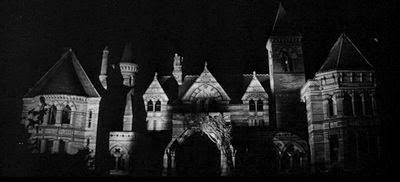The world is stunned when four commuter planes crash within hours of each other on different continents. Facing global panic, officials are under pressure to find the causes. With terrorist attacks and environmental factors ruled out, there doesn't appear to be a correlation between the crashes, except that in three of the four air disasters a child survivor is found in the wreckage.
Dubbed The Three by the international press, the children all exhibit disturbing behavioural problems, presumably caused by the horror they lived through and the unrelenting press attention. This attention becomes more than just intrusive when a rapture cult led by a charismatic evangelical minister insists that the survivors are three of the four harbingers of the apocalypse. The Three are forced to go into hiding, but as the children's behaviour becomes increasingly disturbing, even their guardians begin to question their miraculous survival...
***
Before the Frankfurt Book Fair a few years ago, a partial manuscript of The Three was sent to a selection of editors. A perfect storm of offers followed, and less than a day later, a substantial six figure sum from the Hodder & Stoughton coffers proved sufficient to secure the company Sarah Lotz's phenomenal novel. On the strength of an excerpt alone, this was practically unprecedented, especially for an author absent a track record to trade on.
But that, as a matter of fact, isn't entirely accurate: though The Three is the first book to bear her name in such a prominent place outside of South Africa, Lotz has been around the block and back—in the publishing business, that is. In the past, she's worked with her daughter Savannah on the Deadlands saga; she's one of three writers behind Helena S. Paige's pseudonymous Choose Your Own Erotica novels; The Three, however, has most in common with the scathing urban horror Lotz and Louis Greenberg collaborated on as S. L. Grey: not enjoyable novels, no—the events the Downside descents document being altogether too terrible to take pleasure from—but blerrie good books, to be sure. As, in its way, is Lotz's latest.
A horror novel with a hell of a high-concept, The Three is a nightmarish indictment of contemporary culture in much the same way The Mall and The Ward were. Instead of demonstrating the darker side of capitalism or the health system, however, here, Lotz sets her sights on the religious right—in particular the way some folks use faith to advance their own agendas.
But that, as a matter of fact, isn't entirely accurate: though The Three is the first book to bear her name in such a prominent place outside of South Africa, Lotz has been around the block and back—in the publishing business, that is. In the past, she's worked with her daughter Savannah on the Deadlands saga; she's one of three writers behind Helena S. Paige's pseudonymous Choose Your Own Erotica novels; The Three, however, has most in common with the scathing urban horror Lotz and Louis Greenberg collaborated on as S. L. Grey: not enjoyable novels, no—the events the Downside descents document being altogether too terrible to take pleasure from—but blerrie good books, to be sure. As, in its way, is Lotz's latest.
A horror novel with a hell of a high-concept, The Three is a nightmarish indictment of contemporary culture in much the same way The Mall and The Ward were. Instead of demonstrating the darker side of capitalism or the health system, however, here, Lotz sets her sights on the religious right—in particular the way some folks use faith to advance their own agendas.

























